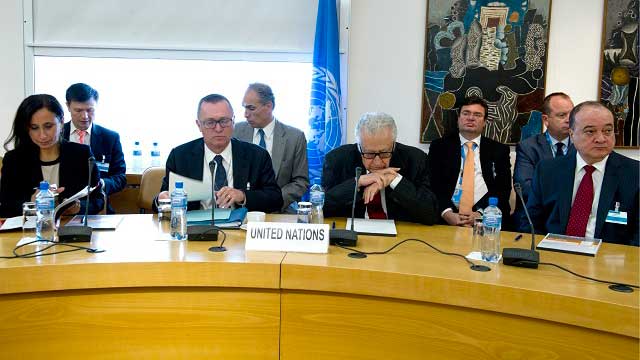SUMMARY
This is AI generated summarization, which may have errors. For context, always refer to the full article.

GENEVA, Switzerland – A long-awaited peace conference for war-torn Syria appeared set for further delays Tuesday, November 5, as sharp divisions persisted between the rival camps over the conditions for their participation.
UN-Arab League envoy to Syria Lakhdar Brahimi was meeting with a range of senior diplomats in Geneva Tuesday in a fresh push to prepare a new international conference aimed at ending the Syrian conflict.
A landmark US-Russia accord reached in September to destroy Syria’s chemical arsenal by mid-2014 had raised hopes that diplomatic efforts might also manage to coax the warring sides to the negotiating table later this month.
But a source close to Tuesday’s meeting told Russian news agency ITAR-TASS that it was now clear the conference, dubbed Geneva II, would happen “no earlier than December.”
Geneva II is meant to follow up on a conference last year that produced a transition plan for the war-ravaged country which was never implemented in a bid to end a conflict that has already killed more than 120,000 people and forced millions to flee their homes.
It was initially planned for June, but has been repeatedly delayed amid stark disagreement over the premises for the talks and the list of participants.
The fate of Syrian President Bashar al-Assad remains the main sticking point, with an ever more splintered opposition refusing to attend unless Assad’s resignation is put up for discussion — a demand rejected by Damascus.
Assad ‘will remain head of state’
The Syrian regime, whose participation in the talks dubbed Geneva II has long been seen as a given, stressed Monday, November 4, it would not accept negotiations that aimed to oust Assad.
“We will not go to Geneva to hand over power as desired by (Saudi Foreign Minister Prince Saud) al-Faisal and certain opponents abroad,” Omran al-Zohbi was quoted by the official SANA news agency as saying.
“President Bashar al-Assad will remain head of state,” he added.
US Secretary of State John Kerry stressed to reporters in Warsaw Tuesday that the whole point of the pending peace conference was to put in place a transition government acceptable to both sides.
“I don’t know how anybody believes the opposition is going to give mutual consent to Assad to continue,” he said, urging the Syrian regime to “live up to its obligation to come to Geneva to negotiate a peaceful resolution to the conflict in Syria.”
The emir of Qatar, a main backer of the Syrian rebellion, meanwhile criticized Tuesday what he claimed were unconditional terms for Geneva II, insisting that without a clear timetable the talks would “lead nowhere.”
Complicating issues further, Russian Foreign Minister Sergei Lavrov reiterated Tuesday that Moscow wants Iran to have a seat at the Geneva II table, despite threats from the rebels that they will boycott the conference if Tehran is invited.
The main umbrella opposition National Coalition has said it plans to meet in Istanbul on Saturday, November 9, to decide whether to attend the peace talks, but the Syrian National Council, a key member of the bloc, has threatened to quit if it does so.
Some opposition groups have also warned that anyone who participates in the conference will be deemed traitors.
Brahimi has warned that “if the opposition does not participate there will be no Geneva conference.”
Despite the thorny task before him, the veteran Algerian diplomat nonetheless remained upbeat ahead of Tuesday’s meetings in Geneva.
“We hope (the peace conference) will take place in the next few weeks, not next year,” he said last week.
Brahimi met Tuesday morning with Russian deputy foreign ministers Gennady Gatilov and Mikhail Bogdanov and US Under Secretary of State for Political Affairs Wendy Sherman.
Representatives of the three other permanent members of the UN Security Council – China, France and Britain – were set to join the meeting later Tuesday, as were representatives of the UN, Arab League and Syria’s neighbors, Iraq, Jordan, Lebanon and Turkey. – Rappler.com
Add a comment
How does this make you feel?
There are no comments yet. Add your comment to start the conversation.